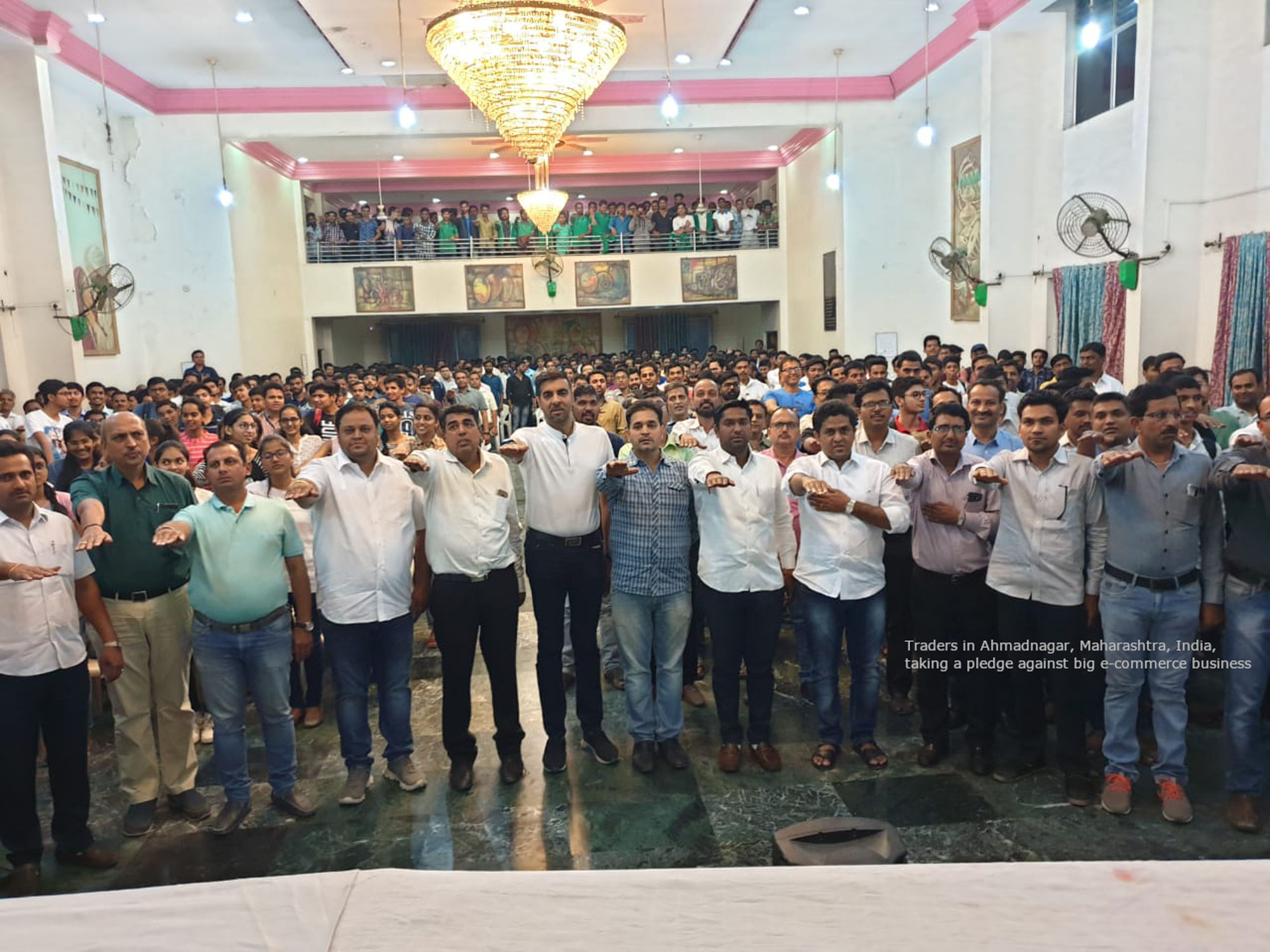Parminder Jeet Singh (IT for Change) talks about the implications of the Walmart-Flipkart deal in the context of the large amounts of data involved, as well how it will affect both customers and producers.
Walmart’s Takeover of Flipkart: Over 100 National Groups Highlight Dangers to Economy
PRESS RELEASE June 4, 2018 | New Delhi
New Delhi: Even as Walmart’s $16 billion takeover bid for e-commerce firm Flipkart, touted as the world’s largest e-commerce deal, awaits regulatory approval, over 100 national groups released an open statement in the capital today highlighting multifaceted dangers to the Indian economy and calling for its nullification. The statement asserts that the concentration of economic power over the e-commerce sector between two US MNCs (Amazon and Walmart) constitutes a potential duopoly in India, rendering them too powerful to be meaningfully regulated.
Apart from key associations of traders, like Bhartiya Udyog Vyapar Mandal, signatories to the statement include trade unions such as All India Central Council of Trade Unions (AICCTU), Centre of Indian Trade Unions (CITU) and the New Trade Union Initiative (NTUI) together representing millions of workers across the country. Peasant organisations such as All India Kisan Sabha (AIKS), Alliance for Sustainable and Holistic Agriculture (ASHA) and Indian Coordination Committee of Farmers movement (ICCFM) have also opposed the deal.
Mohan Gurnani, President of the Chamber of Associations of Maharashtra Industry and Trade (CAMIT) asserted that ‘the worst affected will be small brick-and-mortar retail stores accounting for over 90% of the Indian retail sector, SME manufacturers, small delivery companies and suppliers of goods including farmers whose margins will be ruthlessly squeezed. Walmart is well-known for its global supply chain, especially of cheap goods from China, which means local manufacturers and suppliers, will suffer deep hits’. Alongwith CAMIT, a number of traders’ organisations such as Chhattisgarh Chamber of Commerce & Industries, Grains Rice & Oils Merchants Association, Indian Chamber of Commerce and Vidarbha Chamber of Commerce & Industry will campaign against the Walmart takeover. Shyam Bihari Misra, President, Bhartiya Udyog Vyapar Mandal, says: ‘Government should consult traders and first frame policy for domestic e-commerce pending which the Walmart-Flipkart deal should be shelved. It is also not in line with government’s Make in India thrust.’
Challenging the assertion that consumers in India will gain with the availability of cheap imported goods, Prof Prabhat Patnaik, argued that ‘consumers are not a distinct identity from local producers who will be displaced by cheaper imports. With the control of the Indian market by two multinational retail giants, we will see two distinct processes of deindustrialisation; one of local traders and the other of local producers’.
President of the Free Software Movement of India (FSMI), Prabir Purkayastha, said that e-commerce companies now have integrated online and offline strategies and, ‘It should therefore be clear to everyone that allowing 100% FDI in e-retail in India is but a violation and a back-door entry of foreign players into multi-brand retail. He further pointed to the hypocrisy of the BJP as a political party that ‘a decade ago strongly opposed the entry of Walmart into India, and is now happy to welcome its far more powerful, digitally-enabled avatar’.
Parminder Jeet Singh from IT for Change said that e-commerce firms such as Amazon and now Walmart seek to own and control key data of all economic activity across sectors resulting in unassailable market power. ‘National policy or regulatory remits over them would then be as ineffective as they currently are over Google or Facebook. Manufacturers, suppliers and traders, producers and service providers, all become enslaved to digitally controlled platforms, working as per their parameters, but denied any rights or just returns’. This point was further elaborated by Amitava Guha from the Centre of Indian Trade Unions (CITU) who said that ‘Walmart has a long history of being anti trade unions, paying poverty wages and disregarding social security laws. In e-commerce, work will also be outsourced to couriers and other service providers, making it a long stretch to prove that they are workers. Further, even if Walmart and Amazon employ a few thousand more, they are unlikely to neutralise the massive employment loss associated with the collapse of both the formal and informal retail sector’.
Other signatories to the statement include networks such as the All India Peoples Science Network, National Alliance of Peoples Movements , National Fishworkers Forum and National Hawker Federation. The statement calls for a national debate involving all the affected constituencies, and an informed democratic decision based on it. The groups intend to submit the statement to the Government and Members of Parliament. Further plans include a national convention on the issue and taking the campaign on the rise of foreign corporate control over key sectors of the economy across the country. (ENDS)
For more information contact: Afsar Jafri – a.jafri[at]focusweb.org , Dharmendra Kumar – dkfordignity[at]gmail.com
